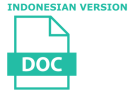Penggunaan Budaya Pop Korea dalam Proses Pembelajaran Bahasa Korea bagi Mahasiswa dengan Gaya Belajar Campuran
Ummul Hasanah(1*), Mery Kharismawati(2)
(1) Universitas Gadjah Mada
(2) Universitas Gadjah Mada
(*) Corresponding Author
Abstract
Many students learn Korean language because they love Korean pop culture such as song, movie, and TV show at the first place. To achieve learning goals, lecturer must match the class activities to students’ learning style. The purpose of this research is to find out the effectiveness of Korean pop culture usage in Korean language learning activities. Beside that, to find what kind of class activities gain interest to Korean language learners. By using questionnaire and observation method, it is found that Korean language students like visual learning style and the combination of visual, auditory, and kinesthetic learning style. However, there are also some students who cannot decide their own learning style. With the mixed learning style, students are more flexible to follow learning activities and can adapt easier when learning environment changes. Although most respondents support the use of Korean pop culture in the class activities, some students state their disagreement. The reasons for their disagreement are because they worry that learning atmosphere will be disturbed because the class will be too noisy and they also want to differentiate between learning in the class and enjoying Korean pop culture outside classroom.
Keywords
Full Text:
PDFReferences
Admin GTK Madrasah. (2019). Pola Pendidikan Yang Tepat Bagi Generasi Z dan Generasi Alfa. Diakses pada September 2019 dari https://gtkmadrasah.kemenag.go.id/2019/07/03/pola-pendidikan-yang-tepat-bagi-generasi-z-dan-generasi-alfa/
Akram Awla, H. (2014). Learning Styles and Their Relation to Teaching Styles. International Journal of Language and Linguistics, 2 (3), 241. https://doi.org/10.11648/j.ijll.20140203.23
Bire, A.L. et.al. (2014). Pengaruh Gaya Belajar Visual. Auditorial, dan Kinestetik Terhadap Prestasi Belajar Siswa. Jurnal Kependidikan, 44 (2): 168-174.
Bobbi DePorter & Mike Hernacki. (2000). Quantum Learning. Edisi Revisi. Kaifa, Bandung.
Chania, Y. Et.al. (2016). Hubungan Gaya Belajar Dengan Hasil Belajar Siswa Pada Pelajaran Biologi Kelas X SMAN 2 Sungai Tarab Kabupaten Tanah Datar. Journal of Sainstek, 8 (1): 77-84.
Harsono. Strategi Belajar. Pusat Pengembangan Pendidikan Universitas Gadjah Mada.
Haynes, J. Teach to students' learning styles. Diakses dari http://www.everythingesl.net/inservices/l earningstyle.php
Melisa. (2016). Gaya Belajar Generasi Z. Majalah 1000 guru.net. Diakses pada September 2019 dari http://majalah1000guru.net/2016/08/gaya-belajar-generasi-z/
Mofareh, Al Qahtani (2015). The importance of vocabulary in language learning and how to be taught. International Journal of Teaching and Education, Vol. III (3), pp. 21- 34., https://doi.org/10.20472/TE.2015.3.3.002
Muhtadi, A. (2006). Karakteristik gaya belajar mahasiswa ditinjau dari preferensi sensori dan lingkungan. Jurnal TEKNODIKA, 4 (7), 1–21.
Pratama. H. C. (2012). Cyber Smart Parenting. Bandung. PT. Visi Anugerah Indonesia.
Rani, S. P. (2016). Korean Wave Sebagai Salah Satu Pendukung Nation Branding yang dilakukan oleh Korea Selatan. Universitas Indonesia.
Simbar, F. K. (2016). Fenomena Konsumsi Budaya Korea Pada Anak Muda Di Kota Manado. Holistik, (18), 1–20.
Strait Times. (2018). Korsel-Indonesia Sepakat Kerjasama Ekonomi dan Pertukaran Masyarakat. Diakses dari https://www.matamatapolitik.com/korea-selatan-indonesia-sepakat-tingkatkan-kerjasama-ekonomi-dan-pertukaran-masyarakat
Suryani, N. P. E. (2015). Korean Wave sebagai Instrumen Soft Power untuk Memperoleh Keuntungan Ekonomi Korea Selatan. Global. Jurnal Politik Internasional, 16 (1), 69–83. https://doi.org/10.7454/global.v16i1.8
Syarfuni, & Verawati. (2017). Analisis Karakteristik Gaya Belajar Mahasiswa Pendidikan Bahasa Inggris Angkatan 2016 Stkip Bina Bangsa Getsempena Banda Aceh. Genta Mulia VIII (1), 75–83.
Xu, W. (2011). Learning styles and their implications in learning and teaching. Theory and Practice in Language Studies, 1 (4),413–416. https://doi.org/10.4304/tpls.1.4.413-416
Article Metrics
Refbacks
- There are currently no refbacks.
Copyright (c) 2019 The Author(s)

This work is licensed under a Creative Commons Attribution-ShareAlike 4.0 International License.







